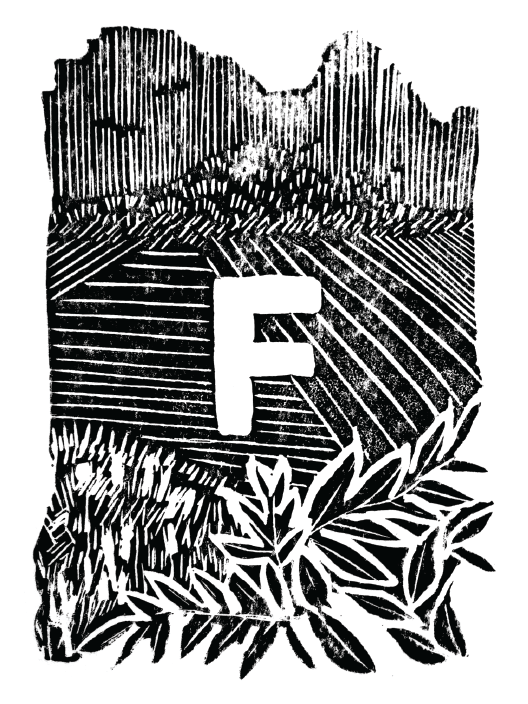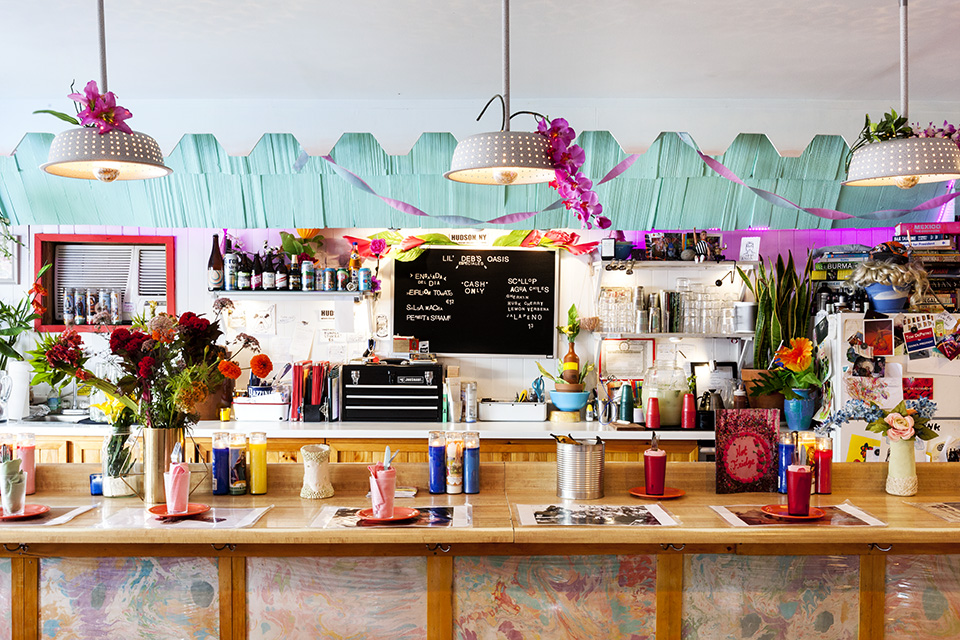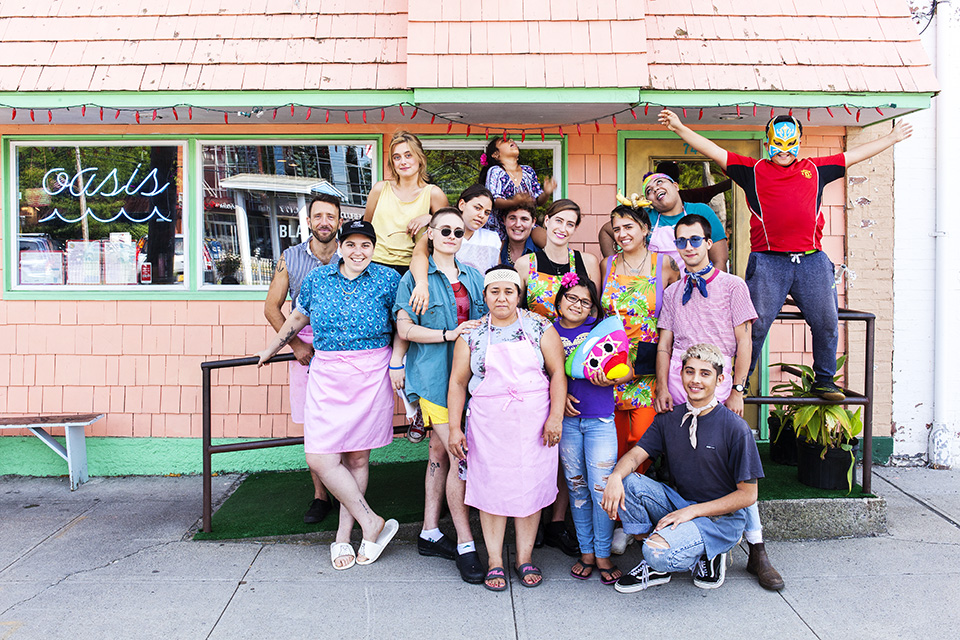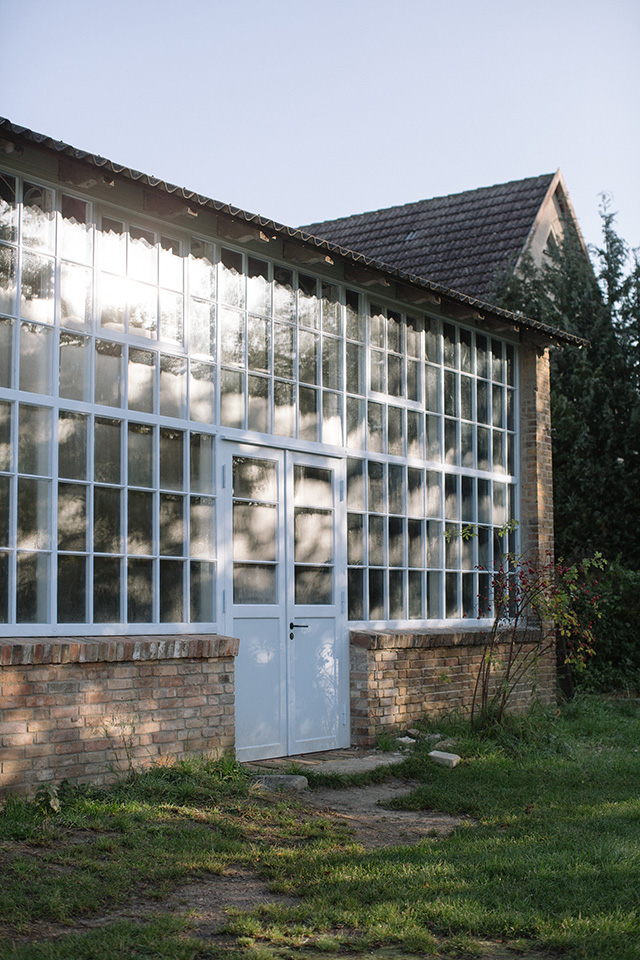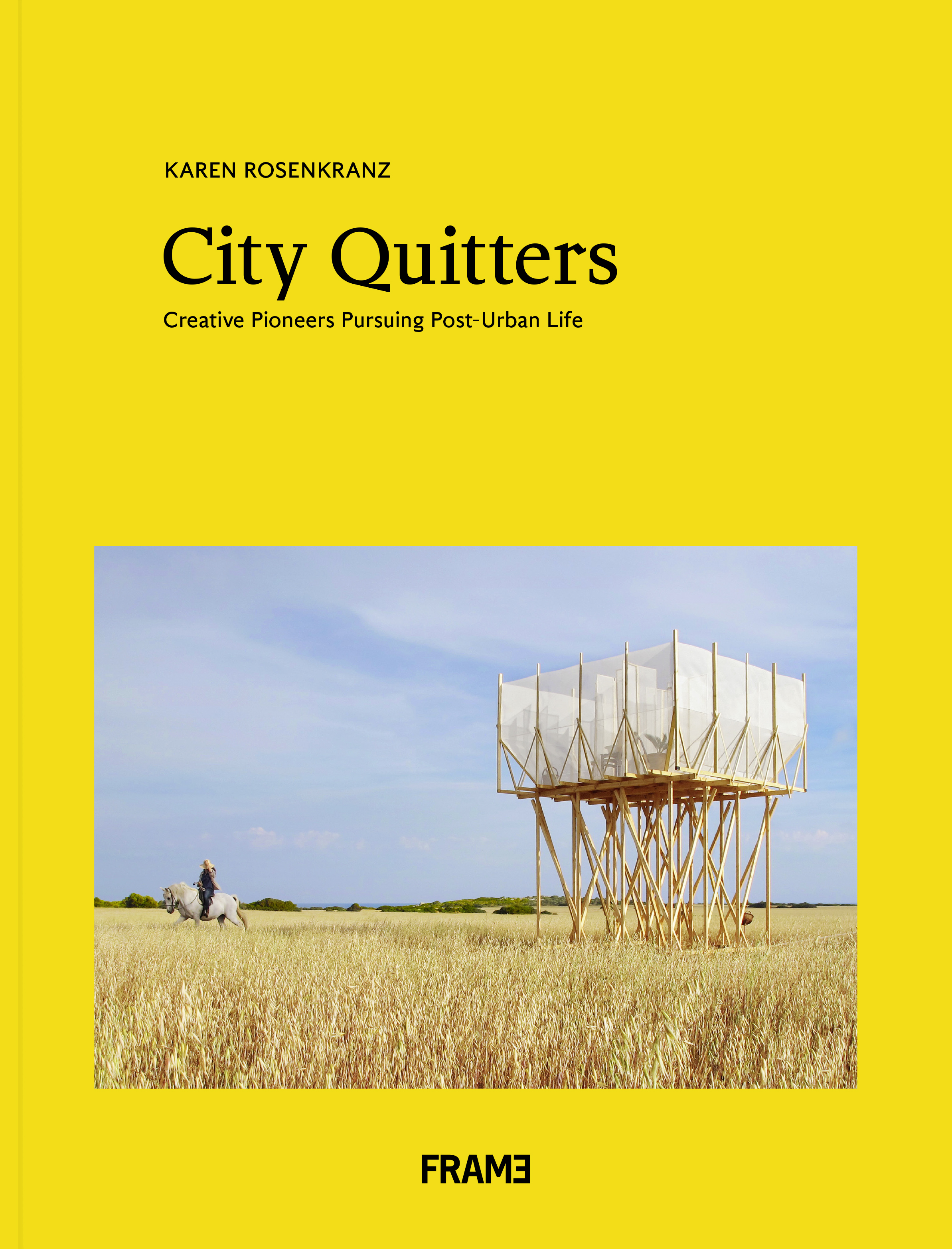City Quitters
In her newest publication, Karen offers insight into the whys, wheres, and how-tos for creatives choosing to leave citylife behind. From an architect who had lived in Barcelona, Melbourne, Mumbai, and Madrid, and is now based on a family farm in Es Llombards, Majorca; to designers from Portland and San Francisco who, after the birth of their daughter, relocated to Miyanoura, Yakushima; to an entrepreneurial couple who left São Paulo and Rome for their grandfather’s land in Serra de Bocaína, Paraty, and currently run a food-tech startup and permaculture consultancy. Here, she shares her thoughts on urban-rural migration trends, the potential role of designers within rural communities, and what creatives might need in order to succeed in the countryside.
Interview with Karen Rosenkranz, ethnographer and trend forecaster.
‘The aesthetic of the restaurant bucks the more common 'rustic-modern' trend with a cheerful, tropical vibe.’ Lil’ Deb’s Oasis. Hudson, New York, USA. Photo: Heidi's Bridge.
Fields in Fields: Where have you called ‘home’ before settling in London?
Karen Rosenkranz: I was born and grew up in Frankfurt, studied in Graz, lived in Amsterdam and New York, and London has been my home since 2006. My roots however, are in rural Austria, Styria, where both my parents are from.
Fields: What first drew you to ethnography and trend forecasting?
KR: Curiosity! And a desire to unearth new ideas or shifts in people’s mindsets. I studied product design and, from the beginning of my career, I have always been more interested in the research and concept phases of the design process. I’m fascinated by people who think differently and love exploring other cultures, so it was a natural progression to move into trend forecasting and ethnography.
The kind of work I do allows me to be very nosy and get a deep insight into people’s life. I always found this a very humbling and eye-opening experience. People surprise me. We are so quick in forming an opinion about others, but humans are complex and contradictory. If you approach people with an open mind, you can learn something valuable from anyone.
Bathroom door at Lil’ Deb’s Oasis. Photo: Heidi's Bridge.
Team portrait including Carla Perez-Gallardo and Hannah Black, founders of Lil’ Deb’s Oasis. Photo: Heidi's Bridge.
Fields: Do you think countryside working-living suits certain personalities or business types more so than others? Are there habits or traits needed for someone or a business to thrive in rural environments?
KR: The people I have met are all very independently minded. There’s an element of going against the grain. They don’t have many examples to follow, so they need to find their own way of carving out a career away from the city. It’s not easy, but it also allows you to reinvent yourself to a certain extent. The reasons for leaving the city are often very banal — craving more space, a slower pace, connection to nature or better quality of life as parents. But one common driver is definitely an underlying desire for greater autonomy and self-reliance, having more control over how you work.
I guess the environment also requires you to be comfortable being alone with your own thoughts. The quietness might be challenging to certain people, while others perceive it as a luxury.
A certain degree of openness and willingness to interact with people who think differently also helps. In cities we tend to surround ourselves with like-minded people. Surprisingly, many people who have moved to the countryside describe this experience of getting out of their bubble as very refreshing. It gives them a new perspective on life.
Lynn Mylou, founder of A Vida Fausto. Cerdeira, Arganil, Portugal. Photo: Amie Galbraith.
Fields: Are there important opportunities available to rural-based creatives today, in terms of both creative process and business success?
KR: Removing yourself from the urban environment can be very freeing. There is less distraction and comparison, and usually less financial pressure. It allows people to be more daring and experimental in their output, and as a result naturally find their own voice or expression. In cities you’re more likely to be influenced, maybe subconsciously, by what everybody else is doing.
I also noticed that many people find a new rhythm of working by paying closer attention to the seasons, time of day or natural cycles, which can be very nurturing and inspiring. Being surrounded by nature, animals and quietness can have a profound impact on people and help them cultivate healthier work habits.
Another aspect is the physicality that often comes with rural life, something that is completely lacking in our urban lifestyles. Having to build or fix something with your own hands — whether it’s tending to a garden or building a fence — can be very satisfying and a great antidote to the desk-based work most people do.
From a business perspective, the main advantage is cost. Less rent, more space. It’s a lot easier to try things out, go at a slower pace. Anecdotally, there also seems to be more enthusiasm and support for new initiatives and businesses, whereas in the city you’re just adding to the noise.
‘Lynn describes her animals as 'important teachers and companions'. Her project 'A Vida Fausto' is even named after one of her dogs, 'Fausto'.’ Photo: Amie Galbraith.
Fields: What about unique challenges?
KR: Finding committed employees can be really difficult. For now, the most ambitious, talented people still tend to move to big cities. It can be quite a struggle to find an experienced social media manager in rural Wales, for example. It might mean that you need to invest more time in training people or you allow employees more flexibility, so they can do other things on the side.
A story in my book features two chefs / artists who opened a restaurant in Hudson, NY which also doubles as an event space and gallery. They encourage staff to keep up their side hustles. “A lot of our employees have other projects going on. We love that. There’s a collaborative effort, it makes us a richer place. I think other businesses stifle that in a certain way and suffer because of it.”
Adopting a rural life can also mean having to adjust to a slower pace, which can be frustrating initially. In cities we are used to everything being available instantly and on-demand. That mindset doesn’t work in the countryside.
Fields: Are there any stories that stand out to you from your book?
KR: I was fascinated by the story of the Chinese couple, Lu and Guan, who left their well-paid jobs in Beijing for a simple rural life, growing most of their own food and following their creative dreams. A move that was a total rebellion against the definition of success in present-day China and the beliefs of their parents.
Another really inspiring story is Lynn’s journey from busy, urban agency life to a near autonomous existence in rural Portugal. It’s a radical shift, not just in terms of environment. Lynn also cultivated an alternative way of working and being in the world, completely redefining what it means to lead a successful and abundant life.
In the kitchen with Lu and Guan. ‘There are no restaurants in the village so Lu and Guan always cook, believing the food tastes so much better because the ingredients are all home-grown.’ Photo: Huang Lu.
Fields: I was particularly intrigued by the stories about rural-based creatives seeking to create work for rural-based markets, as I often find that rural-based creatives rely on connectivity to city markets to keep their businesses afloat. Do you think there are certain types of businesses that are better suited to local/rural markets, vs others more suited for urban markets?
KR: I think it’s all about nuance. How do you tailor your offer so that it speaks to the rural population, or maybe both a rural and urban audience? Often there is a transitional period, where people have just relocated to the countryside and still rely mainly on their urban network. But the longer people live away from the city, the less they seem to depend on it, both socially and professionally.
A great example for striking a balance is Michael Wickert, a fish smoker based in Gerswalde in rural Germany. He manages to attract both weekend visitors from nearby Berlin, as well as old-established locals. It was a deliberate choice for him: “There are a lot of very fancy, artisanal products out there that are often too artsy for the rural population. I don’t want that. My products should be for everybody.”
Lu and Guan’s home. Photo: Huang Lu.
Fields: Where do you think trends in urban-rural migration are heading towards?
KR: I don’t expect urban-rural migration to become a mainstream trend. The UN predicts that two-thirds of the global population will live in urban areas by 2050. However, city growth in major US cities is slowing down, as more people move to smaller cities or rural areas. The number of millennials leaving London is at a record high, too.
I definitely see rural life becoming more aspirational. More and more people are questioning the value of urban living, and the emergence of rural business hubs and creative communities will entice more people to move to the countryside. A re-discovery of rural areas as exciting places to live and work might also help to take some pressure off our overcrowded cities.
Fields: What role do you think creatives will play in future rural societies?
KR: I think designers and people working in creative fields are uniquely equipped to find new, imaginative solutions to complex problems. They often think and work across disciplines, bringing people from different backgrounds together. In cities, it is often artists and the creative community that rejuvenate run-down areas, so I hope they can also play a role in regenerating rural areas that have been deserted by young people and businesses. We need new, future-focused visions for rural life that aren’t tinged by nostalgia or an idealised concept of nature.
Michael Wickert, fish smoker, founder of Glut & Späne. ‘The 'Palmenhaus' nearby is used for workshops and as a pop-up coffee shop.’ Gerswalde, Uckermark, Germany. Photo: Claudia Bühler.
Smoked trout, Glut & Späne. Gerswalde, Uckermark, Germany. Photo: Claudia Bühler.
Luke Evans (on left), artist and photographer in Withington, Herefordshire, UK; Karen Rosenkranz (on right), London-based ethnographer and trend forecaster. Photo: Claudia Rocha.
Fields: By meeting and studying the lives of City Quitters are you tempted to leave London behind as well?
KR: I have lived in cities all my live, and I love London for its diversity, tolerance, and creative energy. But I am also excited by the thought of living somewhere less densely populated, and bringing some ideas from my experience in cities to a rural situation. What or where that might be I’m not sure yet.
Cerdeira, Arganil, Portugal. Photo: Amie Galbraith.
Gerswalde, Uckermark, Germany. Photo: Claudia Bühler.
Bei Shi Cao Zhen, Shunyi, China. Photo: Huang Lu.
The future is going to be challenging, messy, and improvised.
Greatest extravagance: An obscene consumption of dark chocolate.
A trend, event, or idea that has truly excited you recently: Last November I did a creative residency at the Bothy Project. Me and a friend of mine spent a week living and working in a secluded bothy in the middle of the Cairngorms National Park in Scotland. Although it seems so obvious — spend time in nature, stay off-line, live simply — the effect was transformative. Everything becomes a ritual and creativity just flows. Instead of trying to see and do lots of things, you explore your immediate surroundings on a micro level. It was an incredibly productive and fulfilling experience.
City Quitters: Creative Pioneers Pursuing Post-Urban Life
by Karen Rosenkranz
'What does it mean to leave the city behind? Can the reality of living in the countryside fulfil our desire for a better, simpler, more creative life? My book sheds a light on what rural life can be like today, with all its joys and challenges, providing a fresh look at the people and scenes thriving outside urban spaces.
From experimental co-habitation in a renaissance castle to oversized artworks on a farm, City Quitters offers a global perspective on creative post-urban life: 22 stories from 12 countries and five continents, all based in places with fewer than 10,000 inhabitants.'
Available at Frame Publishers.
First edition: 13 Sept 2018. Hardcover: 256 pages.
Cover photo: Gartnerfuglen, Mariana de Delás.
Published on: 3 June 2019. Edited by Fields in Fields. All images courtesy of Karen Rosenkranz, with quoted captions from her book, City Quitters. ■ Visit karenrosenkranz.com
